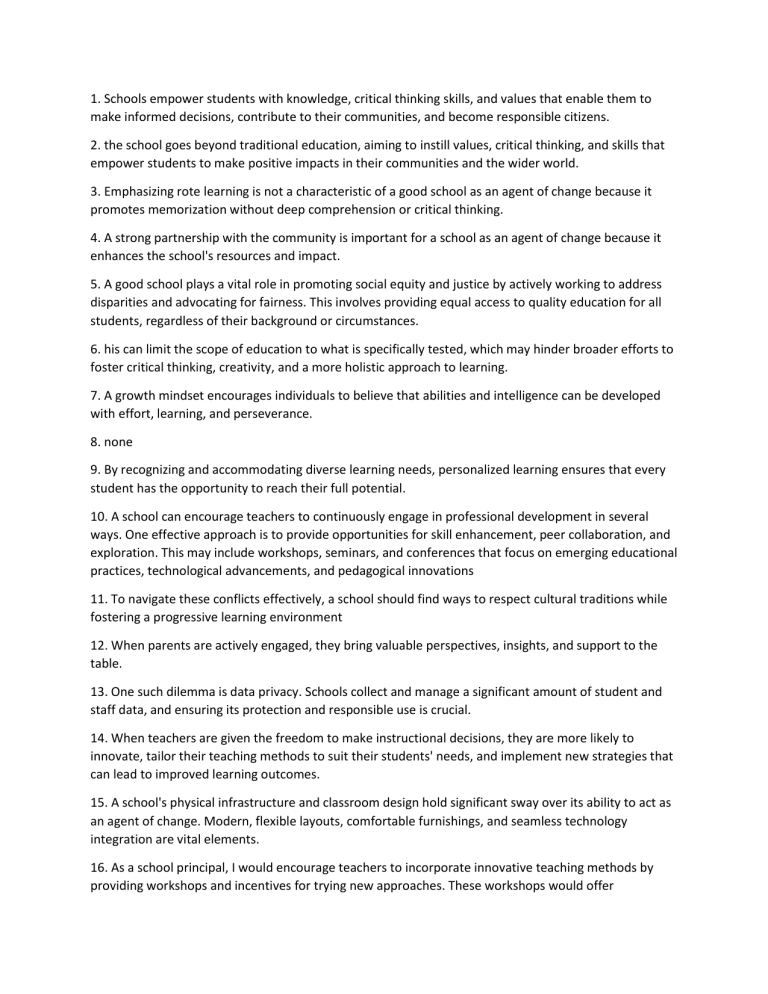
1. Schools empower students with knowledge, critical thinking skills, and values that enable them to make informed decisions, contribute to their communities, and become responsible citizens. 2. the school goes beyond traditional education, aiming to instill values, critical thinking, and skills that empower students to make positive impacts in their communities and the wider world. 3. Emphasizing rote learning is not a characteristic of a good school as an agent of change because it promotes memorization without deep comprehension or critical thinking. 4. A strong partnership with the community is important for a school as an agent of change because it enhances the school's resources and impact. 5. A good school plays a vital role in promoting social equity and justice by actively working to address disparities and advocating for fairness. This involves providing equal access to quality education for all students, regardless of their background or circumstances. 6. his can limit the scope of education to what is specifically tested, which may hinder broader efforts to foster critical thinking, creativity, and a more holistic approach to learning. 7. A growth mindset encourages individuals to believe that abilities and intelligence can be developed with effort, learning, and perseverance. 8. none 9. By recognizing and accommodating diverse learning needs, personalized learning ensures that every student has the opportunity to reach their full potential. 10. A school can encourage teachers to continuously engage in professional development in several ways. One effective approach is to provide opportunities for skill enhancement, peer collaboration, and exploration. This may include workshops, seminars, and conferences that focus on emerging educational practices, technological advancements, and pedagogical innovations 11. To navigate these conflicts effectively, a school should find ways to respect cultural traditions while fostering a progressive learning environment 12. When parents are actively engaged, they bring valuable perspectives, insights, and support to the table. 13. One such dilemma is data privacy. Schools collect and manage a significant amount of student and staff data, and ensuring its protection and responsible use is crucial. 14. When teachers are given the freedom to make instructional decisions, they are more likely to innovate, tailor their teaching methods to suit their students' needs, and implement new strategies that can lead to improved learning outcomes. 15. A school's physical infrastructure and classroom design hold significant sway over its ability to act as an agent of change. Modern, flexible layouts, comfortable furnishings, and seamless technology integration are vital elements. 16. As a school principal, I would encourage teachers to incorporate innovative teaching methods by providing workshops and incentives for trying new approaches. These workshops would offer opportunities for professional development, where teachers can learn about and experiment with innovative techniques. 17. As a student in a school aspiring to be an agent of change, I can contribute to creating a more inclusive environment by engaging in respectful conversations and learning from diverse peers. 18. A school can collaborate with external organizations in several ways to bring about positive changes in the community. This includes partnering with community groups for various projects and initiatives. 19. A school can promote environmental consciousness among its students and staff by introducing ecofriendly practices, such as recycling programs and energy-saving initiatives. This involves implementing concrete measures to reduce waste, conserve energy, and minimize the environmental impact of the school's operations. 20. As a teacher, I would integrate technology into my lessons by incorporating relevant digital tools that engage students and facilitate learning. This could include using interactive presentations, educational apps, online resources, and collaborative platforms to enhance the learning experience. 1. The "4th industrial revolution" is primarily characterized by the integration of digital technologies into various aspects of life. This revolution represents a transformative shift in how technology is used, impacting industries, economies, and societies globally. 2. Artificial intelligence and automation are closely associated with the 4th industrial revolution because they represent two of the most transformative and disruptive technological advancements of this era. 3. The 4th industrial revolution impacts the job market by introducing automation and advanced technologies that can replace certain tasks traditionally performed by humans. 4. One of the main concerns related to the 4th industrial revolution and the workforce is the potential for decreased demand for certain types of skilled workers. This is because the integration of advanced technologies, automation, and artificial intelligence can lead to the automation of tasks that were previously performed by humans. 5. The 4th industrial revolution significantly enhances global connectivity through digital platforms. It has revolutionized communication and information sharing by enabling instantaneous and widespread dissemination of information across the globe. 6. The 4th industrial revolution significantly impacts education by necessitating the inclusion of technological literacy in the curriculum. As technology becomes increasingly integrated into various aspects of society, it is crucial for students to develop skills in areas such as digital literacy, coding, data analysis, and proficiency with digital tools. 7. Technologies like artificial intelligence (AI) play a significant role in the 4th industrial revolution by enhancing decision-making and automation processes. 8. The 4th industrial revolution is likely to significantly affect healthcare. It can introduce innovations like telemedicine, which allows for remote consultations and healthcare delivery. 9. In the context of the 4th industrial revolution, data holds immense significance. It serves as a valuable resource that provides insights, informs decision-making, and fuels innovation across various industries 10. The 4th industrial revolution has the potential to positively impact environmental sustainability by introducing more energy-efficient technologies and solutions. As advanced technologies become integrated into various industries, there is an opportunity to develop and implement innovations that reduce resource consumption, minimize waste, and decrease environmental impact.


